In the last year or so, Warner Home has taken the lead in DVD special editions. Happily, this commitment to quality has spread to their standard releases. They’ve recently put out a selection of award-winners from the ‘50s and ‘60s, just in time for the Oscars:
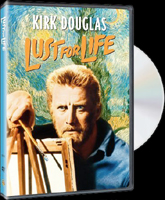 BUY IT AT AMAZON: CLICK HERE!
BUY IT AT AMAZON: CLICK HERE!
STUDIO: Warner Bros.
MSRP: $19.98
RATED: NR
RUNNING TIME: 122 min.
SPECIAL FEATURES:
• Commentary by Dr. Drew Casper
• Theatrical Trailer
The Pitch
In Vincente Minnelli’s 1956 film from Irving Stone’s novel, Vincent Van Gogh quests desperately for his place in the world, only to find his calling as a painter in the then-unpopular and unprofitable Expressionist style. Interestingly, we spend a half-hour on his abortive career as a missionary before he picks up a paintbrush.
Kirk Douglas, never exactly an internal performer, is visually perfect casting in the lead, and his outsize mannerisms complement the man’s emotional nakedness. The inner workings of Vincent’s mind, however, remain a cipher. Anthony Quinn, on the other hand, breathes ripsnorting life into the role of Paul Gauguin—he justly won the Academy Award for Best Supporting Actor.
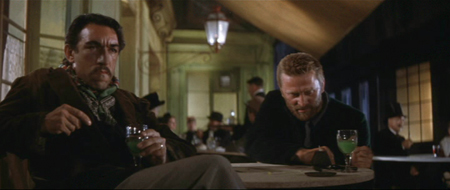
"You ass. This isn’t absynthe– it’s that wheatgrass crap."
The Perks
The anamorphic transfer does nicely by Freddie Young’s ‘scope photography, though the color seems just a touch muted considering the subject. Some scenes, particularly those with wide blue skies, suffer from inconsistent hues; apparently a source defect of the early single-strip AnscoColor process.
The only extra on this disc besides the trailer is the commentary track. Sadly, it’s dry as dirt. Dr. Casper, speaking from text, spends most of his time on generalities such as the cultural climate of the post-WWII period, the film industry’s embrace of color and widescreen processes in the 1950s, and Vincente Minnelli’s other films. His oratory style, though fine for a classroom, quickly becomes tiresome in itself with its emphatic repetitions and reiterations.
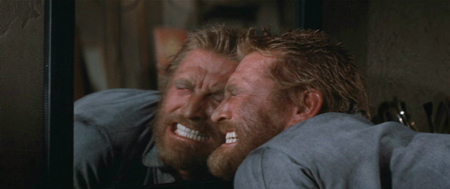
Kirk was unclear on the concept of self-love.
The Bottom Line
Dr. Casper’s claims of historical significance notwithstanding, Lust For Life retains only limited value today. The visual juxtaposition of Van Gogh paintings with shots of their actual locations (or recreations of them) remains striking, but most of Minnelli’s technical innovations are more impressive for what he’s attempting than for what he achieves. One can only imagine what his films would have looked like twenty years later, with the benefits of fast film and a SteadiCam.
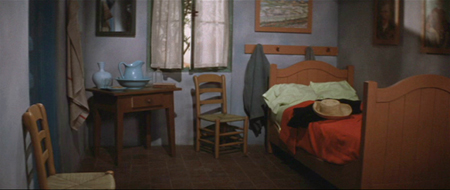
The Flick: 6 out of 10
The Disc: 6 out of 10
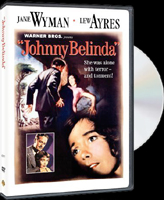 BUY IT AT AMAZON: CLICK HERE!
BUY IT AT AMAZON: CLICK HERE!
STUDIO: Warner Bros.
MSRP: $19.98
RATED: NR
RUNNING TIME: 102 min.
SPECIAL FEATURES:
• “The Little Archer” short
• Theatrical Trailer
The Pitch
Young Dr. Richardson (Lew Ayres) comes to live in a remote Nova Scotia fishing village and befriends a neglected deaf-mute girl (Jane Wyman) in Johnny Belinda, a major 1948 Oscar contender.
Belinda learns to sign and read lips, and starts socializing just enough that she catches the eye of ladies’ man Locky (Stephen McNally), who promptly assaults her in a barn after a party. Shortly after, Belinda is discovered to be pregnant. Richardson’s jealous secretary Stella (Jan Sterling), thinking the doctor is the father, sues to adopt the child, unaware that her own fiancée is the rapist in question…
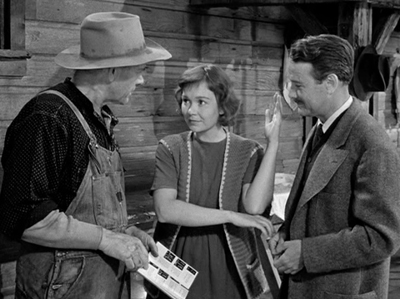
"The Aristocrats!"
The Perks
No commentaries or featurettes, which is too bad. I wanted to learn more about the logistics of telling such an explicit story under the guidelines of the Production Code in the late ‘40s. For you mystery fans: see if you can connect the dots and figure out why, exactly, in an age before DNA testing, the good doctor is excused as a paternity suspect.
We do get the original trailer, and it’s worth noting that it features an alternate shot of Belinda cowering before Locky’s attack—in the film the frame is cropped to show only Wyman’s face.
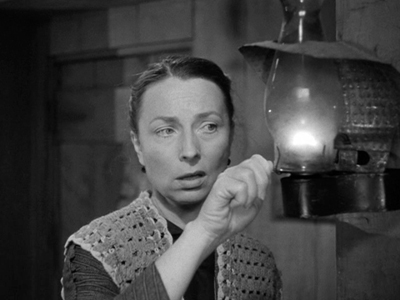
‘Lamptris’ shipped exclusively with the original Gameboy.
The Little Archer is an odd short feature about a little boy playing with wild animals, embellished with stock footage from The Adventures of Robin Hood.
The Bottom Line
Johhny Belinda gets off to a rough start with much stagey action and several dubious Scotch-Canadian accents, but improves greatly once we meet Belinda. The saintly deaf-mute role may have been Oscar bait, but it’s damned effective Oscar bait. Wyman deserved her trophy, if only for divorcing Ronald Reagan that same year.
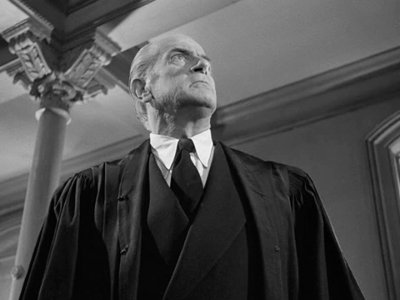
"Screw your fancy columns! I can support this ceiling by myself!"
Max Steiner’s score is well worth noting, especially in a scene where he uses a brief snippet of fiddle music to suggest a repressed memory. Ted McCord’s black-and-white cinematography reflects director Jean Negulesco’s affinity for close-ups, and is well-represented at standard 1.33:1.
The Flick: 7 out of 10
The Disc: 5 out of 10